|
|
|
Sort Order |
|
|
|
Items / Page
|
|
|
|
|
|
|
| Srl | Item |
| 1 |
ID:
112753
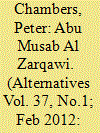

|
|
|
|
|
| Publication |
2012.
|
| Summary/Abstract |
On June 7, 2006, Abu Musab al Zarqawi, the United States' 'public enemy number two', was killed by two 500lb bombs, dropped by US forces on the safe house in which he and others were hiding. This paper is about the making and unmaking of Al Zarqawi as a monster, and his curious afterlife as a governmental technology. As we pass the fifth anniversary of his death, this detailed study of Al Zarqawi offers an invaluable general lesson for the political analysis of terror. Zarqawi's monstration - his making and unmaking as a monster - tells us about the powers of naming and linking that characterize executive power in the age of globalized media systems, and the productive relation between diurnal practices of security work and the nocturnal phantasms of cultural memory carried by media which, this paper argues, drive and sustain wars in the twenty-first century.
|
|
|
|
|
|
|
|
|
|
|
|
|
|
|
|
| 2 |
ID:
118194
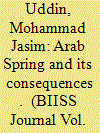

|
|
|
| 3 |
ID:
141895
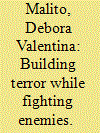

|
|
|
|
|
| Summary/Abstract |
Somalia has become a front in the US Global War on Terror (GWoT) because of the potential connection between terrorism and state fragility. While originally oriented towards ‘building states while fighting terror’, Enduring Freedom in Somalia obtained quite the opposite result of deepening the existing conflict. Why and how did the GWoT result in the controversial outcome of ‘building terror while fighting enemies’? This article argues that the GWoT sponsored in Somalia an isolationist strategy that encouraged the political polarisation and military radicalisation of the insurgency. To explore this argument, the article first analyses the structure of the intervention by focusing on the interests and strategies of the interveners. Then it evaluates the conditions under which the modality of intervention (through the use of diplomatic, economic and coercive measures) violated the conditions essential to resolving conflict.
|
|
|
|
|
|
|
|
|
|
|
|
|
|
|
|
| 4 |
ID:
164102


|
|
|
|
|
| Publication |
New Delhi, Pentagon Press, 2019.
|
| Description |
xxxvi, 264p.hbk
|
| Standard Number |
9789386618818
|
|
|
|
|
|
|
|
|
|
|
|
Copies: C:2/I:0,R:0,Q:0
Circulation
| Accession# | Call# | Current Location | Status | Policy | Location |
| 059600 | 303.625/PAN 059600 | Main | On Shelf | General | |
| 059601 | 303.625/PAN 059601 | Main | On Shelf | General | |
|
|
|
|
| 5 |
ID:
121436
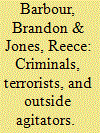

|
|
|
|
|
| Publication |
2013.
|
| Summary/Abstract |
This article is a critical geopolitical analysis of Chinese media representations of the 5 July 2009 riots in Xinjiang, China. Significant events often define the geopolitical climate by creating a space for the construction of boundaries between identity categories and the appropriate norms for behaviour towards the Other. The post-riot reports framed the event through the prism of the global war on terror to justify a violent response to protect Chinese citizens from the perceived threat of the Other. After connecting theories of narratives, the event, and group making, the article identifies three representational tropes - the criminal, the terrorist, and the outside agitator - in Chinese documents that create boundaries between the identity categories Uyghur and Han and define how the Other should be treated. The three representation tropes of the Other in the aftermath of the 5 July riots simultaneously situate the protestors as outside Chinese society and perpetuate the claim of the superiority of Chinese culture and civilisation.
|
|
|
|
|
|
|
|
|
|
|
|
|
|
|
|
| 6 |
ID:
129601
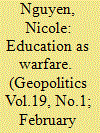

|
|
|
|
|
| Publication |
2014.
|
| Summary/Abstract |
Across history, the US has strategically used education to buttress its war efforts. The current US global 'war on terror' is no different. The US's amplified emphasis on in/security and defence following the September 11 attacks folds education into the assemblage of technologies used to explain and advance military intervention. Through a critical geopolitics framework, this analysis unravels the 'imaginative geographies' that facilitate this absorption of education and feminism into imperial strategy of war by looking at three distinct education interventions. It considers how disparate sites of and engagements with education - materially and discursively - ineluctably work to humanise, justify, and advance US warfare.
|
|
|
|
|
|
|
|
|
|
|
|
|
|
|
|
| 7 |
ID:
124937
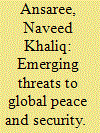

|
|
|
| 8 |
ID:
125917
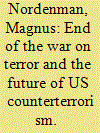

|
|
|
|
|
| Publication |
2013.
|
| Summary/Abstract |
The "Global War on Terror" came to dominate US foreign policy in the wake of the 9/11 attacks. The effort served as a guiding light for how the United States interacted with friends, allies, and adversaries and deeply influenced US priorities around the globe, in general, and in the wider Middle East, in particular. While it will likely never be announced as concluded, the Global War on Terror is effectively over, due to four separate but related reasons: the killing of Osama bin Laden, the perceived failure of counterinsurgency as an effective policy instrument, the significant costs of the effort, and the Arab Awakening. This does not mean, however, that the United States will no longer pursue counterterrorists. Drones and special forces have emerged as the key tools in US counterterrorism, and the United States is likely to continue pursuing terrorist cells and high-value targets aggressively across the globe for decades to come using these means. However, this practice should be viewed as one of many defense efforts that the United States carries out on a regular basis in order to guard the full range of US interests. Elements of the emerging US counterterrorism effort remain problematic, but the end of the Global War on Terror nevertheless presents Washington with a window of opportunity to reorder its relations with the nations and peoples of the Middle East and North Africa and frees up resources for the United States to tackle other emerging strategic priorities, such as the shift of global power to the Pacific, the revival of the US economy, and security challenges such as energy security and cyber defense.
|
|
|
|
|
|
|
|
|
|
|
|
|
|
|
|
| 9 |
ID:
117443
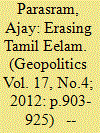

|
|
|
|
|
| Publication |
2012.
|
| Summary/Abstract |
This paper considers the Sri Lanka/Tamil Eelam conflict with attention to how its dramatic end can be explained through postcolonial territorial politics. I argue discourses of postcolonial nationalism and global terrorism aligned along domestic, regional, and international political levels to enable a military victory for the government of Sri Lanka. At the domestic political level, there was a change in government along with a split and defection within the LTTE command. At the international level, there was a turn away from Western allies due to their perceived inability to understand the needs of the Asian front in the global war on terror (GWOT). This led to a geopolitical realignment with China, a state sympathetic to fighting terrorism and secession movements. The case is studied under a theoretical lens of "de/re territorialisation" from Gilles Deleuze and Felix Guattari. De/re territorialisation reveals simultaneous efforts to inscribe nationalist meaning into territory in a constant process of "becoming."
|
|
|
|
|
|
|
|
|
|
|
|
|
|
|
|
| 10 |
ID:
105640
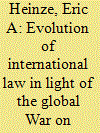

|
|
|
|
|
| Publication |
2011.
|
| Summary/Abstract |
This article explores how various aspects of the 'global War on Terror' may be affecting the future development of international law on the use of force. I examine these effects within three areas of international law - the law of anticipatory self-defence, the law of self-defence against non-state actors, and the applicability of international humanitarian law to non-state armed groups. Only in the latter two areas do I find evidence that international law is evolving to accommodate the new realities of global terror. While such developments in the law reflect the supposed need by states to use military means to combat terrorism, they also seem to confer at least a limited international legal personality upon terrorist groups such as Al-Qaeda. This not only indicates a shift in the basis for legal personality, but also potentially undermines the legitimacy of international law and frustrates states' efforts at combating terrorism.
|
|
|
|
|
|
|
|
|
|
|
|
|
|
|
|
| 11 |
ID:
121674
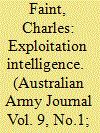

|
|
|
|
|
| Publication |
2012.
|
| Summary/Abstract |
Lessons learned by the United States in the global war on terror and in overseas contingency
operations underscore the value of intelligence information gleaned from the exploitation of
captured enemy personnel, equipment, and materiel. A key element of successful exploitation is accurately categorising information by intelligence discipline in order to apply the
correct resources towards the exploitation effort and maximize exploitation potential. In
light of these revelations, it is time to review the existing intelligence disciplines to determine
whether a new intelligence discipline- exploitation intelligence or 'EXINT'- should be added
to the disciplines currently in existence.
|
|
|
|
|
|
|
|
|
|
|
|
|
|
|
|
| 12 |
ID:
103969
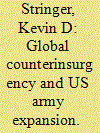

|
|
|
|
|
| Publication |
2011.
|
| Summary/Abstract |
Given the nature of global counterinsurgency operations, the demands of military expansion, and the need for cultural, linguistic, and regional expertise, the United States Army should evaluate the establishment of US-led foreign troop units for its evolving force structure. This article proposes the creation of an American foreign legion based upon the recruitment of US-led, ethnically homogeneous tribal force units to meet the grist mill of counterinsurgency operations. This structured approach would be more beneficial than the current reliance on a de facto American Foreign Legion, represented by private military contractors (PMCs), many of them comprised of foreigners. These PMCs carry a number of oversight, accountability, and legal risks not found in a fully integrated, and US-officered foreign legion. The British Brigade of Gurkhas, the South-West African Police Counter-Insurgency Unit (Koevoet), and the Kit Carson Scouts serve as relevant historical examples where foreign troops were used to supplement national manpower resources.
|
|
|
|
|
|
|
|
|
|
|
|
|
|
|
|
| 13 |
ID:
120330
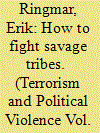

|
|
|
|
|
| Publication |
2013.
|
| Summary/Abstract |
The Bush administration's "Global War on Terror" has, by both defenders and critics, been characterized as unique. However, as this article shows, there is a long tradition, both in the United States and in Europe, of fighting wars against "savage tribes"-against enemies who fail to make a distinction between soldiers and civilians, and who use terror as a weapon. The problem of how to fight such groups was much discussed in the legal literature of the nineteenth century. This is a discussion from which it is possible to learn contemporary lessons.
|
|
|
|
|
|
|
|
|
|
|
|
|
|
|
|
| 14 |
ID:
159373


|
|
|
|
|
| Summary/Abstract |
India has been a major victim of Islamist terrorism and has long fought against an array of Islamist terrorist groups. Since the 9/11 terrorist attacks, India's previously lonely struggle against terrorism has taken place against the background of the US-led Global War on Terror (GWOT). After outlining India's Islamist terrorist challenge, this article examines India's evolving approach to counterterrorism and how the GWOT has influenced it. It concludes that India has adopted a localized, defensive, law-and-order approach to counterterrorism which has evolved in response to various attacks over the years but still remains seriously underdeveloped. The GWOT has influenced Indian counterterrorism in important ways, although its influence has been subtle and indirect rather than transformative. The GWOT has enhanced Indo-American counterterror cooperation, shaped India's terror environment by launching the war in Afghanistan and enriched Indian counterterrorism with American experience. Just as important, it has also had an impact on India's debate on counterterrorism, civil liberties and human rights.
|
|
|
|
|
|
|
|
|
|
|
|
|
|
|
|
| 15 |
ID:
110178
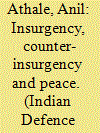

|
|
|
| 16 |
ID:
111619
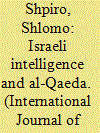

|
|
|
| 17 |
ID:
187467
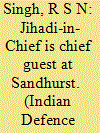

|
|
|
| 18 |
ID:
115824


|
|
|
|
|
| Publication |
2012.
|
| Summary/Abstract |
This article explores Uganda's decision to send peacekeeping troops to Somalia in 2007 as part of the African Union Mission in Somalia (AMISOM) and argues that the intervention has as much to do with Uganda's relationship with its donors as it has with maintaining regional stability - the official justification for intervention. Museveni's decision to intervene in Somalia is the most recent example of his regime's multi-pronged 'image management' strategy in which the President has involved Uganda in numerous foreign and domestic activities to ensure that donors perceive his government in a particular way vis-à-vis their interests: as an economic success story, a guarantor of regional stability, or, in relation to Somalia, an ally in the global war on terror. In so doing Museveni's strategy, conceptualized here within a constructivist framework, has been able largely to avoid censure in areas of traditional donor concern such as governance, thereby achieving a considerable degree of agency in a seemingly asymmetric relationship.
|
|
|
|
|
|
|
|
|
|
|
|
|
|
|
|
| 19 |
ID:
109072


|
|
|
|
|
| Publication |
2011.
|
| Summary/Abstract |
Though British foreign policy toward Iraq was officially separate from counterterrorism strategy, ideas about the "global war on terror" circulated in both policy milieus. This article deploys the concept of the security imaginary, adding insights from Pierre Bourdieu's notion of the habitus, to explore why this was the case. The British security imaginary, as structured by a secular social landscape coming to terms with "radical Islamism," was beholden to a series of problematic assumptions about religio-politics. This article focuses on British perceptions of the Islamist Jaish al-Mehdi militia between 2003 and 2004. Beyond the Iraq example, this historical incident suggests intimate connections between the experience of domestic secularity and warfare.
|
|
|
|
|
|
|
|
|
|
|
|
|
|
|
|
| 20 |
ID:
114987


|
|
|
|
|
| Publication |
2011.
|
| Summary/Abstract |
The quest for perpetual peace is a modern phenomenon, associated with a progressive view of history which emerged only in the Enlightenment. In addition, boredom - a feeling of ennui associated with a loss of the ability to act - is a fundamental mood of the modern age. Modern societies are thus, simultaneously, becoming more peaceful and their inhabitants are becoming more bored. As a means of overcoming our boredom, we are increasingly fascinated by violence, and war is glorified as a means of restoring our ability to act. Empirical illustrations of this thesis are drawn from World War I and from the Bush administration's 'global War on Terror'.
|
|
|
|
|
|
|
|
|
|
|
|
|
|
|
|
|
|
|
|
|